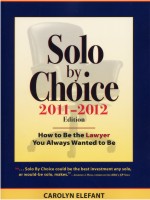 I like it. I recommend it. Go get yourself a copy.
I like it. I recommend it. Go get yourself a copy.
I have talked about Ms. Carolyn Elefant a lot here and it is for good reason. She writes well, she is honest, talented, and (as far as I can tell) she has been down the path that so many solo attorneys face: she has actually started and maintained a successful law practice. She is kind of my hero.
Not only has she done all that, but she has written a book about it and has now issued an update: “Solo By Choice, 2011-2012 Edition“.
As readers of this blog should already know, Ms. Elefant published her first book “Solo By Choice” in 2007. I don’t know what her sales are, but I bought the first edition and loved it. I have purchased several other “start your own law practice guides”; including the laudable J. Foonberg’s “How to Start and Build a Law Practice“. However, in my opinion, Ms. Elefant’s book is the best book on the market about being a solo attorney and building your own law practice.
But, you may ask, if the book was published in 2007, why is there a need for a new edition? I’m not sure and can only guess at more book sales, but it’s no leap to say that this edition is better than the previous one.
The new version contains more meat and new sections which reflect the change in the solo-attorney-legal-market in the last few years. If you haven’t noticed, there has been a shift in a thing called the world-economy. This has had a considerable effect on many professions – including the practice of law. Ms. Elefant is keenly aware of this and blogs about it at MyShingle.com.
The new edition reflects these changes. In recent years, there has been an “explosion” of new solo lawyers. The reason appears to be the economy and the continual rise of the digital age. I, and this blog, fit squarely in this purview.
So What’s New?
For starters, the new version (without the companion piece) clocks in at 304 pages while the previous version had about 300 pages. However, what is taken out is mainly in the companion guide (134 pages) and what is put back in is better.
Notably, the companian piece titled, “The Companion Guide, 34 Questions that could Transform Your Legal Career”, is wonderful. Even if she hadn’t changed a thing, I would buy the book just for the add-on.
Much has been discussed about how solo attorneys often face personal and professional isolation. Let’s face it: solo = alone. The Companion Guide is like your new cadre of lawyer best-friends. It’s other solos out there talking about real issues about the practice of law.
Topics range from: In the Beginning, A Day in the Life, The Business of Solo’ing, Reflections, and Expanded Profiles. I have to say, reading this companion piece makes me excited to be a lawyer again. That feeling is worth the price of purchase by itself.
To be fair, much of the companion piece is a little obvious. There is a lot of talk about what not to do, what I like, and how I shouldn’t have spent so much on overhead at first. Etc. However, the simplicity rings true. When you whittle things to the nub, the truth often comes out – simple or not. I like that so many of the attorneys in the companion piece echo each other. It’s obvious that they are happy and enjoying what they are doing. Isn’t that what ‘solo by choice’ is all about?
As far the new edition itself goes, Ms. Elefant has updated many sections to reflect the changes of running a law practice and marketing it. She has beefed up the “Dealing with Clients” chapter a bit. I appreciated that because I am a young attorney who sometimes needs to think about competence more than marketing.
She has also made some changes to the marketing section of the book. In particular, a new chapter is entitled “Marketing in an Age of Changing Technology.” This chapter includes some re-hash from the previous edition, but most of it is new. I particularly appreciated the topics of ‘website optimization’, ‘smart-phone apps.’, ‘SEO’, and other pertinent digital-media marketing.
If you follow her blog, you will also see new and better discussion of video and teleconference marketing. Some of the discussion isn’t so good for people like me who run a family law practice, but it’s all there and should be read.
What I particularly enjoyed about the new content can be summarized by her new “Argument #6. Opportunity to Innovate” in Chapter 1, titled “The Case for Solo Practice”. Much of the discussion revolves around the changes in technology which make the practice of law better. Things like cloud-computing, teleconferencing, webinars, and host of technological advancements that make a solo practice better get their due.
Furthermore, I appreciated her citation to a ABA Technology Report, which provides that “nearly half of solo and small firm lawyer lack even rudimentary online presence.” That is not surprising, and maybe even good for new solos who can leverage new technology better than their competition. Reading this new content isn’t a game-changer, it’s a refresher on why you wanted to be solo in the first place.
In sum, I’ll quote Ms. Elefant from her new companion guide:
[Y]ou can take comfort in this: the dozen of solos cited in the Companion Guide once stood at the same precipice where you are now and none of them too the leap without regret.
Well said, Carolyn, well said.

